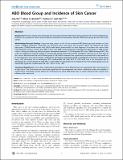| dc.contributor.author | Xie, Jing | |
| dc.contributor.author | Qureshi, Abrar A. | |
| dc.contributor.author | Li, Yunhui | |
| dc.contributor.author | Han, Jiali | |
| dc.date.accessioned | 2013-01-25T17:57:14Z | |
| dc.date.issued | 2010 | |
| dc.identifier.citation | Xie, Jing, Abrar A. Qureshi, Yunhui Li, and Jiali Han. 2010. ABO blood group and incidence of skin cancer. PLoS ONE 5(8): e11972. | en_US |
| dc.identifier.issn | 1932-6203 | en_US |
| dc.identifier.uri | http://nrs.harvard.edu/urn-3:HUL.InstRepos:10229933 | |
| dc.description.abstract | Background: Previous studies have examined the association between ABO blood group and the risk of some malignancies. However, no prospective cohort study to date has examined the association between ABO blood group and the risk of skin cancer. Methodology/principal findings: Using two large cohorts in the US, we examined ABO blood type and incidence of skin cancer, including melanoma, squamous cell carcinoma (SCC), and basal cell carcinoma (BCC). We followed up study participants (70,650 female nurses and 24,820 male health professionals) on their diagnosis of incident skin cancer from cohort baseline (1976 in women and 1986 in men) until 2006. Study participants reported their blood type in 1996 in both cohorts. During the follow-up, 685 participants developed melanoma, 1,533 developed SCC and 19,860 developed BCC. We used Cox proportional hazards models to calculate the hazard ratios (HR) and 95% confidence intervals (CI) of each type of skin cancer. We observed that non-O blood group (A, AB, and B combined) was significantly associated with a decreased risk of non-melanoma skin cancer overall. Compared to participants with blood group O, participants with non-O blood group had a 14% decreased risk of developing SCC (multivariable HR: 0.86; 95% CI: 0.78, 0.95) and a 4% decreased risk of developing BCC (multivariable HR: 0.96; 95% CI: 0.93, 0.99). The decreased risk of melanoma for non-O blood group was not statistically significant (multivariable HR: 0.91; 95% CI: 0.78, 1.05). Conclusion/significance: In two large independent populations, non-O blood group was associated with a decreased risk of skin cancer. The association was statistically significant for non-melanoma skin cancer. Additional studies are needed to confirm these associations and to define the mechanisms by which ABO blood type or closely linked genetic variants may influence skin cancer risk. | en_US |
| dc.language.iso | en_US | en_US |
| dc.publisher | Public Library of Science | en_US |
| dc.relation.isversionof | doi:10.1371/journal.pone.0011972 | en_US |
| dc.relation.hasversion | http://www.ncbi.nlm.nih.gov/pmc/articles/PMC2915921 | en_US |
| dash.license | LAA | |
| dc.title | ABO Blood Group and Incidence of Skin Cancer | en_US |
| dc.type | Journal Article | en_US |
| dc.description.version | Version of Record | en_US |
| dc.relation.journal | PLoS ONE | en_US |
| dash.depositing.author | Han, Jiali | |
| dc.date.available | 2013-01-25T17:57:14Z | |
| dash.affiliation.other | HMS^Medicine-Brigham and Women's Hospital | en_US |
| dash.affiliation.other | SPH^Epidemiology | en_US |
| dash.affiliation.other | HMS^Medicine-Brigham and Women's Hospital | en_US |
| dash.affiliation.other | HMS^Dermatology-Brigham and Women's Hospital | en_US |
| dc.identifier.doi | 10.1371/journal.pone.0011972 | * |
| dash.contributor.affiliated | Han, Jiali | |
| dash.contributor.affiliated | Xie, Jing | |


